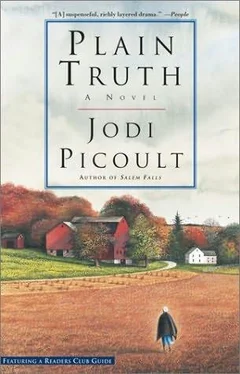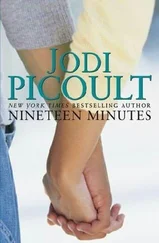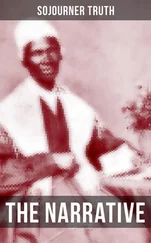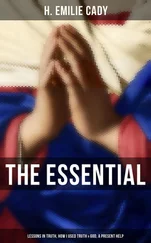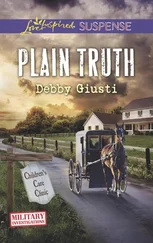Levi, Samuel, and Aaron were milking the cows at their stanchions. Levi seemed resigned to the Amish equivalent of scut work-shoveling manure, scooping out grain-while the two older men wiped down the udders of the cows with what seemed to be the pages of a telephone book, and then hooked them up in pairs to a suction pump powered by the same generator that was indirectly running my computer. From time to time, Aaron would carry the container into the milk room and pour it into the bulk tank with an audible splash.
I watched them for a while, taken by their graceful routine and the kindness of their hands as they stroked the side of a cow’s belly or scratched behind her ears. Smiling, I gingerly plugged in my laptop, made a quick and fervent prayer that this wouldn’t surge and destroy my hard drive, and booted it up.
The screen rolled open in a wash of color, spotted with icons and toolbars. My screen saver came next, a computer graphic of sharks at the bottom of the ocean. I reached for one of the manila files I’d received from the prosecutor and spread it open on the hay. Leafing through its contents, I tried to formulate in my mind a motion for services other than counsel.
When I glanced up, Levi was gaping at the laptop from across the barn, his shovel propped forgotten at his side until Samuel walked over and cuffed him. But then Samuel looked himself, eyes widening at the burst of color and the realism of the sharks. His hand twitched, as if he was trying hard not to reach out and touch what he saw.
Aaron Fisher never even turned his head.
A cow bawled at the far end of the stanchions. The sweet hay and even sweeter feed tickled the inside of my nose. The tug-suck, tug-suck of the milking pump became a backbeat. Closing out this world, I focused and began to type.
The broad beam of light swept over her legs, then arched up the wall and the ceiling before repeating the circuit all over again. Katie came up on her elbows, heart pounding. Ellie was still asleep; that was a good thing. She crawled out of bed and knelt at the window. At first she could see nothing; then Samuel removed his hat and the moon caught the crown of his bright hair. Taking a deep breath, Katie slipped into her clothes and hurried out to meet him.
He was waiting with the flashlight, which he turned off the minute he saw her framed in the doorway. Once Katie walked outside, he caught her in his arms and pressed his lips against hers, hard. It made Katie freeze-he’d never moved this fast before-and she wedged her hands up between them to set her distance. “Samuel!” she said, and immediately he stepped back.
“I’m sorry,” Samuel murmured. “I am. It’s just that I feel like you’re slipping away.”
Katie lifted her eyes. She knew Samuel’s face as well as her own; they’d grown up as family, as friends. He’d chased her into a tree once when she was eleven. He’d kissed her for the first time when she was sixteen, behind Joseph Yoder’s calf shed. On the small of her back, she felt Samuel’s hands move restlessly.
Sometimes when she pictured her life, it was like the telephone poles that marched along the length of Route 340-year after year after year, stretching out all the way to the horizon. And when she saw herself like that, it was always with Samuel standing beside her. He was everything that was right for her; everything that was expected of her. He was her safety net. The thing was, most Plain folks never lifted their faces from the straight and narrow ground, to know that high above was the most wondrous tightrope you could ever have the chance to walk.
Samuel tipped his forehead against Katie’s. She could feel his breath, his words, falling onto her, and she opened her lips to receive them. “That baby wasn’t yours,” he said urgently.
“No,” she whispered.
He tilted his face so that their mouths came together, wide and sweet as the sea. Their kiss tasted of salt, and Katie knew there were tears on both of their cheeks, but she did not recall which of them had passed the sorrow to the other. She opened herself to Samuel as she had never done before, understanding that this was a debt he had come to collect.
Then Samuel drew away from her and kissed her eyelids. He held her face between his hands and murmured, “I’ve sinned.”
She raised her palms to cover his. “You haven’t,” she insisted.
“Yes. Let me finish.” Samuel swallowed. “That baby. That baby, it wasn’t ours.” He gathered Katie closer, burying his face in her hair. “It wasn’t ours, Katie. But I have been wishing it was.”
“Have you ever touched one?”
Adam looked up from the desk, smiling at the sight of Katie bent over one of his logbooks. “Yeah,” he said. “Well, sort of. You can’t grab them, you just sort of feel them come over you.”
“Like a wind?”
Adam set down his pen. “More like a shiver.”
Katie nodded, and very seriously turned back to her reading. This was the second time she’d visited Jacob this week-an unprecedented occurrence, appar ently-and she’d scheduled the visit on a day when she knew that Jacob was working at the college until the afternoon. When Adam sat down beside her, Katie smiled. “Tell me what it was like.”
“I was at an old hotel in Nantucket. I woke up in the middle of the night and found a woman looking out the window. She was wearing an old-fashioned dress, and the air was filled with this perfume-a scent I’d never smelled before, or since. I sat up and asked who she was, but she didn’t answer. And then I realized that I could see the windowsill and the wooden mullions right through her body. She completely ignored me, then walked right past the window, through me. It felt . . . chilly. Made the hair rise on the back of my neck.”
“Were you frightened?”
“Not really. She didn’t seem to know I was there. The next morning, I asked the proprietor, who told me that the hotel had been the home of a sea captain that drowned. It was supposedly haunted by his widow, who was still waiting for her husband to come home.”
“That’s so sad,” Katie said.
“Most ghost stories are.”
For a moment, Adam thought she was going to cry. He reached out and touched Katie’s head. “Her hair, it was like yours. Thick and straight and longer than I’d ever seen.” As she blushed, he sat back and crossed his arms over his bent knees. “Can I ask you a question now?”
“All right.”
“It’s not that I’m not incredibly flattered you’re so fascinated by my re search . . . but you’re the last person I would have expected to find it interesting.”
“Because I’m Plain, you mean?”
“Well, yeah.”
Katie touched her fingers to the words that Adam had typed out. “I know these ghosts,” she said. “I know what it’s like to move around in the world, but not really be a part of it. And I know what it’s like to have people stare right through you, and not believe what they are seeing.” Setting aside the book of research, Katie looked at Adam. “If I exist, why can’t they?”
Adam had once interviewed an entire bus of tourists who’d seen a battlefield at Gettysburg erupt with a battalion of soldiers who were not there. He’d recorded on infrared cameras the colder pockets of energy that surrounded a ghost. He had heard ghosts move crates in attics, slam doors, ring phones. Yet for all the years he had been doing his doctoral research, he’d had to fight for credibility.
Humbled, Adam reached for Katie’s hand. He squeezed it gently, and then raised it to his lips to kiss the inside of her wrist. “You are not a ghost,” he said.
George Callahan frowned at Lizzie’s plate. “Don’t you ever eat anything? You’re gonna blow over in a wind.”
Читать дальше
